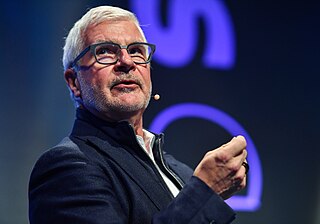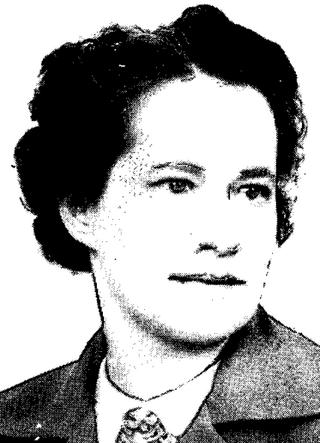
Vegetarian cuisine is based on food that meets vegetarian standards by not including meat and animal tissue products.

A food pyramid is a representation of the optimal number of servings to be eaten each day from each of the basic food groups. The first pyramid was published in Sweden in 1974. The 1992 pyramid introduced by the United States Department of Agriculture (USDA) was called the "Food Guide Pyramid" or "Eating Right Pyramid". It was updated in 2005 to "MyPyramid", and then it was replaced by "MyPlate" in 2011.

A nut is a fruit consisting of a hard or tough nutshell protecting a kernel which is usually edible. In general usage and in a culinary sense, a wide variety of dry seeds are called nuts, but in a botanical context "nut" implies that the shell does not open to release the seed (indehiscent).

A plant-based diet is a diet consisting mostly or entirely of plant-based foods. Plant-based diets encompass a wide range of dietary patterns that contain low amounts of animal products and high amounts of fiber-rich plant products such as vegetables, fruits, whole grains, legumes, nuts and seeds. They do not need to be vegan or vegetarian, but are defined in terms of low frequency of animal food consumption.

Vegetarian nutrition is the set of health-related challenges and advantages of vegetarian diets.

Loma Linda University (LLU) is a private Seventh-day Adventist health sciences university in Loma Linda, California. As of 2019, the university comprises eight schools and a Faculty of Graduate Studies. It is a part of the Seventh-day Adventist education system. The university is accredited by the WASC Senior College and University Commission (WSCUC). Its on-campus church has around 7,000 members.

A healthy diet is a diet that maintains or improves overall health. A healthy diet provides the body with essential nutrition: fluid, macronutrients such as protein, micronutrients such as vitamins, and adequate fibre and food energy.

Dean Michael Ornish is an American physician and researcher. He is the president and founder of the nonprofit Preventive Medicine Research Institute in Sausalito, California, and a Clinical Professor of Medicine at the University of California, San Francisco. The author of Dr. Dean Ornish's Program for Reversing Heart Disease,Eat More, Weigh Less and The Spectrum, he is an advocate for using diet and lifestyle changes to treat and prevent heart disease.

Hulda Hoehn Crooks was an American mountaineer, dietitian and vegetarianism activist. Affectionately known as "Grandma Whitney" she successfully scaled 14,505-foot (4,421 m) Mount Whitney 23 times between the ages of 65 and 91. She had climbed 97 other peaks during this period. In 1990, an Act of Congress renamed Day Needle, one of the peaks in the Whitney area, to Crooks Peak in her honor.

Vegetarian Diet Pyramid is a nutrition guide that represents a traditional healthy vegetarian diet. Variations of this traditional healthy vegetarian diet exist throughout the world, particularly in parts of North America, Europe, South America and, most notably, Asia. Given these carefully defined parameters, the phrase "Traditional Vegetarian Diet" is used here to represent the healthy traditional ovo-lacto vegetarian diets of these regions and peoples. A pyramid was created by Oldways Preservation Trust in 1998 with scientific research from Cornell and Harvard University and specific reference to the healthy patterns of eating demonstrated by the Mediterranean Diet Pyramid.
Adventist Health Studies (AHS) is a series of long-term medical research projects of Loma Linda University with the intent to measure the link between lifestyle, diet, disease and mortality of Seventh-day Adventists.

David Mark Hegsted was an American nutritionist who studied the connections between food consumption and heart disease. His work included studies that showed that consumption of saturated fats led to increases in cholesterol, leading to the development of dietary guidelines intended to help Americans achieve better health through improved food choices.

Ellsworth Edwin Wareham was an American cardiothoracic surgeon and centenarian from Loma Linda, California who promoted the health benefits of plant-based nutrition.

Steven R. Gundry is an American physician and low-carbohydrate diet author. He is a former cardiac surgeon and cardiac surgery researcher who runs an experimental clinic investigating the impact of diet on health. Gundry is the author of The Plant Paradox: The Hidden Dangers in "Healthy" Foods That Cause Disease and Weight Gain, which promotes the controversial lectin-free diet.
Rachel C. Brown is a New Zealand scientist, professor and deputy head of the Department of Human Nutrition at the University of Otago.

Ulma Doyle Register was an American biochemist, nutritionist, Seventh-day Adventist and vegetarianism activist known for his research on Vitamin B12. He was chairman of the Department of Nutrition at Loma Linda University School of Public Health.

Esther Kathleen Keen Zolber was an American registered dietitian, Seventh-day Adventist and vegetarianism activist. She was president of the American Dietetic Association 1982–1983.

Alice Garrett Marsh was an American registered dietitian, Seventh-day Adventist and vegetarianism activist.

Phyllis B. Acosta was an American public health researcher best known for her research on inherited metabolic disorders and vegetarian diets. She was a pioneer in developing nutritional therapy for management of phenylketonuria.

Hans Diehl was an American physician and Seventh-day Adventist, best known for his advocacy of lifestyle medicine and whole food plant-based nutrition. He was the founder of the Complete Health Improvement Program (CHIP).
















